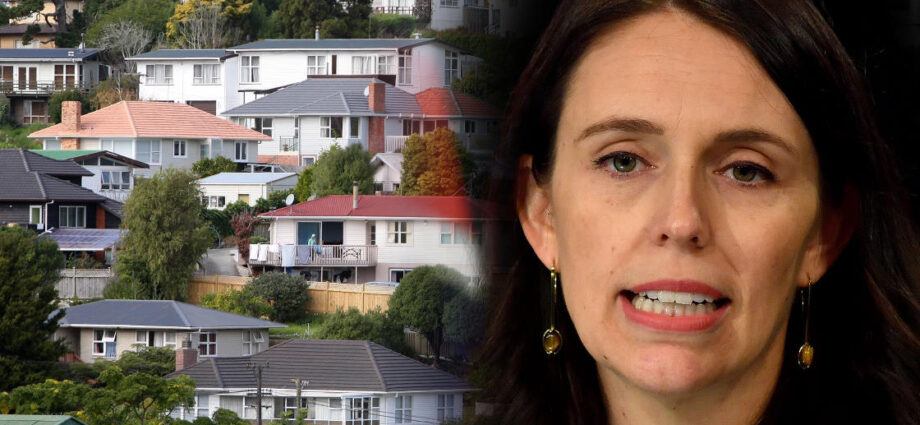PHOTO: NZ housing has been put in the firing line. GETTY
A world economy already contending with raging inflation, stock-market turmoil and a grueling war is facing yet another threat: the unraveling of a massive housing boom.
As central banks around the globe rapidly increase interest rates, soaring borrowing costs mean people who were already stretching to buy property are finally reaching their limits. The effects are being seen in countries such as Canada, the US and New Zealand, where once-hot residential real estate markets have suddenly turned cold.
It’s a sharp reversal from years of surging prices fueled by rock-bottom mortgage rates and government stimulus, along with a pandemic that popularized remote work and sent homebuyers on the hunt for bigger spaces. An analysis by Bloomberg Economics shows that 19 OECD countries have combined price-to-rent and home price-to-income ratios that are higher today than they were ahead of the 2008 financial crisis — an indication that prices have moved out of line with fundamentals.
New Zealand at Top of Risk Ranking
Five gauges of property risk for OECD member and accession countries
Sources: Bloomberg Economics; BIS; OECD
Note: Bloomberg Economics ranking obtained by taking an average of the z-scores of each of the five measures. The higher the score, the greater the risk of a price correction. Annual house-price and credit growth are based on Q1 2022 or latest quarterly data available.
Taming frothy home prices are a key part of many policy makers’ goals as they seek to quell the fastest inflation in decades. But as markets shudder from the prospects of a global recession, a slowdown in housing could create a ripple effect that would deepen an economic slump.
Falling home prices would erode household wealth, dent consumer confidence and potentially curb future development. Animal spirits are typically tamed when people are faced with higher repayment costs on an asset that’s losing value. And property construction and sales are huge multipliers of economic activity around the world.
“The danger is business and financial cycles turning down simultaneously, which can lead to longer-lasting recessions,” said Rob Subbaraman, head of global markets research at Nomura Holdings Inc. “A decade of QE has fueled frothy housing markets and we could be entering the other side of this soon, as housing affordability is stretched and debt-service ratios could rise sharply.”
Such a scenario would gum up bank lending as the risk of bad loans increases, choking the flow of credit that economies thrive on. In the US and Western Europe, the housing crash that precipitated the financial crisis hobbled banking systems, governments and consumers for years.
To be sure, a 2008-style collapse is unlikely. Lenders have tightened standards, household savings are still robust and many countries still have housing shortages. Labor markets are also strong, providing an important buffer.
“Lower prices will have a direct effect on consumer spending and the whole economy, as typically real estate makes up a significant part of households’ wealth,” said Tuuli McCully, head of Asia-Pacific economics at Scotiabank. “Nevertheless, as household balance sheets in many major markets remain healthy, I am not particularly worried about risks related to house prices and the world economy.”
Still, the risk of a sharp drop in prices is clearly greater when there’s a synchronized global tightening of monetary policy, said Niraj Shah of Bloomberg Economics in London. More than 50 central banks have raised interest rates by at least 50 basis points in one go this year, with more hikes expected. In the US, the Federal Reserve last week boosted its main interest rate by 75 basis points, its biggest increase since 1994.
Housing markets in New Zealand, the Czech Republic, Australia and Canada rank among the world’s bubbliest and are particularly vulnerable to falling prices, according to Bloomberg Economics. Portugal is especially at risk in the euro area, while Austria, Germany and the Netherlands also are looking frothy.
In Asia, South Korea house prices also look vulnerable, according to an analysis by S&P Global Ratings. That report noted risks from household credit relative to nominal GDP, the growth rate of household debt and the speed of house-price gains. Elsewhere in Europe, Sweden has seen a dramatic turnaround in housing demand, sparking concern in a country where debt runs at 200% of household income.
Goldman Sachs Group Inc. economists wrote in a report last week that the signals from home sales typically precede prices by about six months, indicating that several countries are likely to see further declines in values. A substantial cooldown in housing markets is an important reason why developed economies will likely slow, according to the economists led by Jan Hatzius.
“The very rapid deterioration in affordability and large drops in home sales suggest that a hard landing is a meaningful risk, especially in New Zealand, Canada, and Australia, although that is not our baseline given current tightness,” the Goldman economists wrote.
Central banks are issuing warnings of their own. The Bank of Canada said this month in its annual review of the financial system that high levels of mortgage debt are of particular concern as interest rates rise and more borrowers are strained to pay bills. The Reserve Bank of New Zealand’s semi-annual Financial Stability Report said that the overall threat to the financial system is limited, but a “sharp” decline in house prices is possible, which could significantly reduce wealth and lead to a contraction in consumer spending.
“As borrowing costs rise, real estate markets face a critical test,” Bloomberg’s Shah said. “If central bankers act too aggressively, they could sow the seeds of the next crisis.”
Here is what’s unfolding in bubbly housing markets around the world.
NEW ZEALAND
If 2021 was the year New Zealand’s house-price growth reached dizzying heights, with an annual increase of close to 30%, 2022 is shaping up to be the year the music stops — and the abrupt change has left people scrambling.
In March, Jonathan Milne decided it was time to sell a family home in the Auckland suburb of Onehunga and purchase a larger house nearby for NZ$2 million ($1.3 million). He and his wife, Georgie, were optimistic of a speedy sale and a good price for their old home, which was valued by the local government at NZ$1.8 million.
Ups and Downs
Soaring prices are expected to give way to declines next year
Source: RBNZ, CoreLogic, Stats NZ
All that changed in April when the RBNZ took aggressive action to tackle inflation, hiking the official rate by 50 basis points to 1.5% — its biggest increase in 22 years. It quickly followed with another 50-basis-point jump in May and a projection for the rate to peak at close to 4% next year.
Milne’s house was meant to be sold in May via auction, a popular method of home sales in New Zealand, but not a single bidder showed up for the event.
“What we didn’t anticipate was that it would be so hard to market and sell our house,” said Milne, the 47-year-old managing editor of a news website. “We knew that every week that passed would knock another NZ$100,000 off the price.”
At the end of last month, they accepted an offer that Milne described as “dramatically” below the government valuation.
Economists expect New Zealand house prices will fall about 10% this year and may eventually drop as much as 20% from their late 2021 peak. While for many homeowners that’s a small decline compared with the massive equity gains in recent years, there likely will be broader effects. ANZ Bank forecasts subdued consumer spending due to a mixture of people feeling poorer because of falling house prices, the impact of higher rates on cash flow, as well as higher food and energy prices, according to Sharon Zollner, the bank’s New Zealand chief economist.
“There are going to be house buyers who have just entered the market in the last year or so who started off with a mortgage rate of 2.5% and all of a sudden they are rolling off on to a mortgage rate closer to 6%,” said Jarrod Kerr, chief economist at Kiwibank in Auckland. “There is going to be some pain for sure.” — Ainsley Thomson
READ MORE VIA BLOOMBERG



















